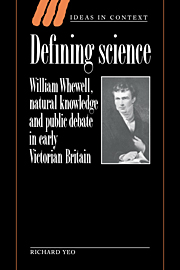
-
Select format
-
- Publisher:
- Cambridge University Press
- Publication date:
- 22 August 2009
- 27 August 1993
- ISBN:
- 9780511521515
- 9780521431828
- 9780521541169
- Dimensions:
- (228 x 152 mm)
- Weight & Pages:
- 0.61kg, 298 Pages
- Dimensions:
- (228 x 152 mm)
- Weight & Pages:
- 0.463kg, 300 Pages
- Series:
- Ideas in Context (27)
Book description
This 1993 book deals with debates about science - its history, philosophy and moral value - in the first half of the nineteenth century, a period in which the 'modern' features of science developed. Defining Science also examines the different forms or genres in which science was discussed in the public sphere - most crucially in the Victorian review journals, but also in biographical, historical and educational works. William Whewell wrote major works on the history and philosophy of science before these became technical subjects. Consequently he had to define his own role as a metascientific critic (in a manner akin to cultural critics like Coleridge and Carlyle) as well as seeking to define science for both expert and lay audiences.
Reviews
‘… a thoughtful discussion of the emergence of science as a major factor in the definition of Victorian civilisation.’
Source: Metascience
‘… at once a seminal vocational biography of the most prominent Victorian metascientist, and a penetrating study of the complex debate about the nature of science in nineteenth century Britain. It is a book no student of Victorian intellectual history can afford to ignore.’
Source: Isis
Contents
Metrics
Altmetric attention score
Full text views
Full text views help Loading metrics...
Loading metrics...
* Views captured on Cambridge Core between #date#. This data will be updated every 24 hours.
Usage data cannot currently be displayed.
Accessibility standard: Unknown
Why this information is here
This section outlines the accessibility features of this content - including support for screen readers, full keyboard navigation and high-contrast display options. This may not be relevant for you.
Accessibility Information
Accessibility compliance for the PDF of this book is currently unknown and may be updated in the future.


